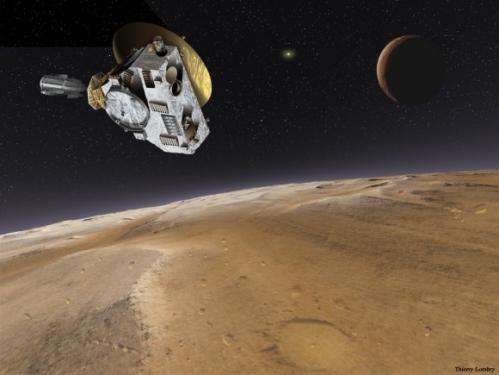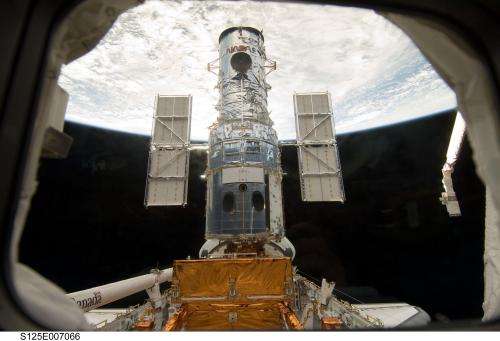Hubble seeks follow-up target for New Horizons after Pluto

It's going to be a really busy summer for the New Horizons team. While they're checking out the newly awakened spacecraft to make sure it's working properly for its close encounter with Pluto next year, NASA is already thinking about where to put it next: possibly towards a Kuiper Belt Object!
So now the Hubble Space Telescope (in Earth orbit) is scoping out icy objects beyond Pluto. Luckily for us, one of the team members—Alex Parker, a planetary astronomer at the University of California, Berkeley, provided an entertaining livetweet of the process—even through a power failure.
So, the secret is out. On Friday, we were awarded the Hubble time to search for a @NewHorizons2015 KBO target!
— Alex Parker (@Alex_Parker) June 16, 2014
This is an extremely quick-turnaround survey. The first observations hit the ground this morning and our team is about to process them.
— Alex Parker (@Alex_Parker) June 16, 2014
Right now there is a robot in space searching the fringes of our solar system for an icy world that another robot will visit in a few years.
— Alex Parker (@Alex_Parker) June 16, 2014
I have seen the first of the Hubble data, and it is beautiful.
— Alex Parker (@Alex_Parker) June 16, 2014
Here's the first raw Hubble image from our KBO search. We should have our first clean stacks by the end of the day. pic.twitter.com/3FNSgDHL4M
— Alex Parker (@Alex_Parker) June 16, 2014

There's far more to Parker's tweets than we are indicating here; his Twitter feed also has details about the collaborators, for example, so be sure to read through the entire exchange from yesterday. The survey is led by the Southwest Research Institute's John Spencer.
What astronomers are doing now is a "pilot observation" where the space telescope looks at a spot in the constellation Sagittarius. Controllers will try to turn the telescope at the same rate as what a KBO would be orbiting around the sun. If the method works, stars will look like streaks and the KBOs will look like "pinpoint objects", NASA stated.
"If the test observation identifies at least two KBOs of a specified brightness it will demonstrate statistically that Hubble has a chance of finding an appropriate KBO for New Horizons to visit. At that point, an additional allotment of observing time will continue the search across a field of view roughly the angular size of the full moon," NASA said in a press release.
The reason for this step is Hubble is a high-profile telescope, receiving a lot of requests for observing time around the world. The agency wants to ensure that the telescope is being used for the best scientific return possible. NASA also noted the search might be difficult.
"Though Hubble is powerful enough to see galaxies near the horizon of the universe, finding a KBO is a challenging needle-in-haystack search. A typical KBO along the New Horizons trajectory may be no larger than Manhattan Island and as black as charcoal," NASA stated.
This isn't the first time the telescope has done a pinch-hit for Plutonian science. Four new moons have been found around Pluto, a discovery that involved Hubble time. The telescope has also looked for dust rings near the dwarf planet (to do a risk analysis for New Horizons' approach) and done a map of the surface, to help controllers figure out where to target New Horizons.
Provided by Universe Today





















